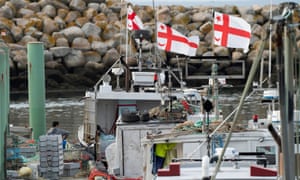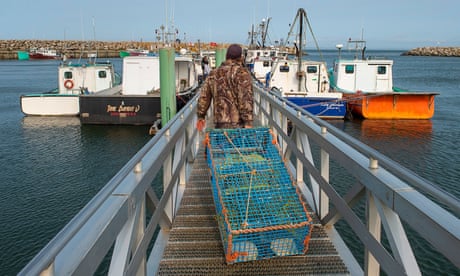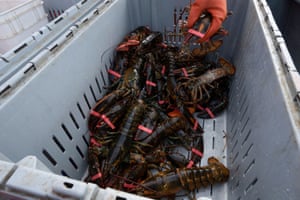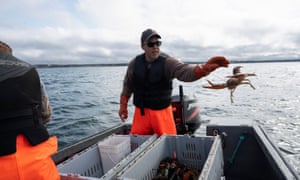Clearwater Seafoods deal gives Mi’kmaq control of lucrative ocean stretch, as tensions remain high over First Nation fishing rights
Seascape: the state of our oceans is supported by
 About this content
About this contentLeyland Cecco Thu 12 Nov 2020

Members of the Sipekne’katik First Nation gathered in Saulnierville, Nova Scotia, to bless the fleet of a self-regulated fishery in September. Photograph: Canadian Press/REX/Shutterstock
For generations, Indigenous peoples in Canada have watched, often in frustration, as commercial industries profit from the land and waters their ancestors once harvested. This week, however, excitement replaced irritation as a group of First Nations announced plans to scoop up one of the largest seafood companies in North America.
Early this week, leaders of the Membertou and Miawpukek First Nations, both of which are Mi’kmaq communities, reached an agreement to buy Nova Scotia-based Clearwater Seafoods in a deal worth C$1bn (£580m). Heralded as the “single largest investment in the seafood industry by any Indigenous group in Canada”, the landmark deal comes at a critical moment for Indigenous communities in the region, as tensions remain high over their treatied fishing rights.
“For 13,000 years, the Mi’kmaq have sustainably fished the waters of Atlantic Canada, and today, on this truly transformational day, we are owners of a global leader in the fishery,” Chief Terrence Paul of the Membertou wrote in a letter to community members, announcing the purchase. “For so many years, our communities were not welcome to participate in big industry. Today, on our own terms we are 50% commercial owners.”
The Mi’kmaq people have been at the centre of a tense battle over fishing rights.
For generations, Indigenous peoples in Canada have watched, often in frustration, as commercial industries profit from the land and waters their ancestors once harvested. This week, however, excitement replaced irritation as a group of First Nations announced plans to scoop up one of the largest seafood companies in North America.
Early this week, leaders of the Membertou and Miawpukek First Nations, both of which are Mi’kmaq communities, reached an agreement to buy Nova Scotia-based Clearwater Seafoods in a deal worth C$1bn (£580m). Heralded as the “single largest investment in the seafood industry by any Indigenous group in Canada”, the landmark deal comes at a critical moment for Indigenous communities in the region, as tensions remain high over their treatied fishing rights.
“For 13,000 years, the Mi’kmaq have sustainably fished the waters of Atlantic Canada, and today, on this truly transformational day, we are owners of a global leader in the fishery,” Chief Terrence Paul of the Membertou wrote in a letter to community members, announcing the purchase. “For so many years, our communities were not welcome to participate in big industry. Today, on our own terms we are 50% commercial owners.”

The Mi’kmaq people have been at the centre of a tense battle over fishing rights.
Photograph: John Morris/Reuters
Partnering with Vancouver-based Premium Brands Holdings Corporation, a number of Mi’kmaq communities will put up C$250m (£145m) for their share of the purchase. The Mi’kmaq will have full ownership of Clearwater’s coveted offshore fishing licences, which allow the harvest of lobster, scallop, crab and clams in a massive tract of ocean known as LFA 41. They also plan to bring more Indigenous peoples into the company’s ranks.
For decades, Clearwater has been a giant in the industry, with a monopoly on offshore fishing licences, which allow for year-round lobster harvest. But as of last year, amid lagging performance, the company signalled it was looking for a buyer. The Membertou First Nation, based in the Cape Breton region, had previously shown an interest in expanding its reach into the commercial industry, when it paid Clearwater C$25m (£14.5m) for two of the company’s eight licences in September.
“In order to be in business, you first have to play the game,” Paul told CBC News after the purchase was announced. “You have to play to win, and we won.”
In addition to Membertou and Miawpukek supporting the deal, a number of other groups in the region, including the Paqtnkek, Pictou Landing, Potlotek, Sipekne’katik and We’koqma’q First Nations, have also expressed an interest in acquiring a stake in Clearwater.

Why were Indigenous crews in Canada shot at with flares for fishing?
https://www.theguardian.com/environment/2020/sep/23/why-indigenous-crews-in-canada-were-shot-at-with-flares-for-fishing
The purchase comes at a critical moment for the Mi’kmaq people, who have been at the centre of a tense and at times violent battle over their right to harvest lobster.
In early September, members of the Sipekne’katik First Nation in Nova Scotia launched their own self-regulated inshore lobster fishery as an exercise of their treaty rights, setting traps during a period in which the season is closed.
Commercial fisherman in the area responded aggressively, harassing the Indigenous boats, cutting their traps and destroying their catch. In late October, a lobster pound rented by the Sipekne’katik was set on fire.
Partnering with Vancouver-based Premium Brands Holdings Corporation, a number of Mi’kmaq communities will put up C$250m (£145m) for their share of the purchase. The Mi’kmaq will have full ownership of Clearwater’s coveted offshore fishing licences, which allow the harvest of lobster, scallop, crab and clams in a massive tract of ocean known as LFA 41. They also plan to bring more Indigenous peoples into the company’s ranks.
For decades, Clearwater has been a giant in the industry, with a monopoly on offshore fishing licences, which allow for year-round lobster harvest. But as of last year, amid lagging performance, the company signalled it was looking for a buyer. The Membertou First Nation, based in the Cape Breton region, had previously shown an interest in expanding its reach into the commercial industry, when it paid Clearwater C$25m (£14.5m) for two of the company’s eight licences in September.
“In order to be in business, you first have to play the game,” Paul told CBC News after the purchase was announced. “You have to play to win, and we won.”
In addition to Membertou and Miawpukek supporting the deal, a number of other groups in the region, including the Paqtnkek, Pictou Landing, Potlotek, Sipekne’katik and We’koqma’q First Nations, have also expressed an interest in acquiring a stake in Clearwater.

Why were Indigenous crews in Canada shot at with flares for fishing?
https://www.theguardian.com/environment/2020/sep/23/why-indigenous-crews-in-canada-were-shot-at-with-flares-for-fishing
The purchase comes at a critical moment for the Mi’kmaq people, who have been at the centre of a tense and at times violent battle over their right to harvest lobster.
In early September, members of the Sipekne’katik First Nation in Nova Scotia launched their own self-regulated inshore lobster fishery as an exercise of their treaty rights, setting traps during a period in which the season is closed.
Commercial fisherman in the area responded aggressively, harassing the Indigenous boats, cutting their traps and destroying their catch. In late October, a lobster pound rented by the Sipekne’katik was set on fire.

Other Indigenous groups have expressed an interest in acquiring a stake in Clearwater. Photograph: John Morris/Reuters
At issue for both sides is the interpretation of a 1999 supreme court ruling, which came after a Mi’kmaq activist, Donald Marshall Jr, was barred from harvesting eel out of season, despite claiming a treaty right to fish. The country’s highest court determined Indigenous peoples had a right to fish their ancestral waters in the pursuit of a “moderate livelihood”. But the court also issued a clarifying decision, which determined that the federal government has the authority to regulate fisheries in the public interest and for conservation.
For two decades, the federal government has failed to clearly define the scope of a “moderate livelihood” fishery and how it would apply to Indigenous peoples.
“We need to sit down with First Nations and do what we should’ve done 250 years ago. We need to review fishery plans and implement them together,” fisheries minister Bernadette Jordan told reporters in October, calling the violence “disgusting”.
The purchase of Clearwater, while it marks a tectonic shift in the industry, doesn’t resolve the ongoing issues over the “moderate livelihood” fishery. Instead, because of the fractious relationship between Indigenous and non-Indigenous fishermen, the deal could further inflame tensions.
“Now that Clearwater is perceived to be a First Nations-owned company, that adds to the mistrust about the expansion of Indigenous fisheries,” Rick Williams, research director for the Canadian Council of Professional Fish Harvesters, told the Canadian press. “It will add to fears that a large company can buy up lobster licences through First Nations that they weren’t able to buy as a company.”

A 1999 supreme court ruling stated Indigenous peoples had a right to fish their ancestral waters, but failed to clarify the scope permitted. Photograph: John Morris/Reuters
Among non-Indigenous fishermen, reactions to the sale were mixed. In Facebook groups dedicated to lobster harvesting, a number of users deployed racist slurs and stereotypes, pledging not to sell their lobster catch to Clearwater’s new owners. Others, however, praised the move as a shrewd business decision.
Paul has said the purchase of Clearwater is a purely commercial venture and that he and others remain committed to establishing a moderate livelihood fishery, guaranteed by their treaty rights.
But he also acknowledged the Clearwater deal was the result of years of fighting for a seat at the table.
“Today, we are keeping our hero, Donald Marshall Jr, in our hearts,” Paul told community members. “It’s a moment we know he would look on with great pride.”
No comments:
Post a Comment